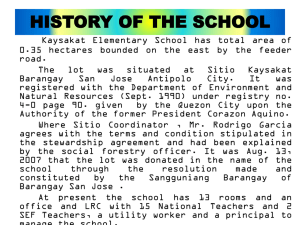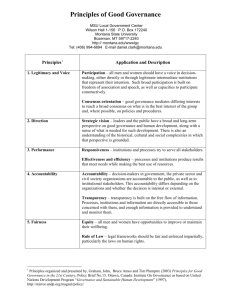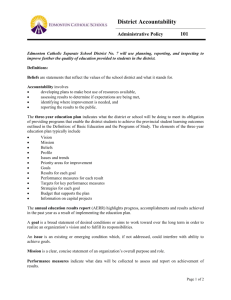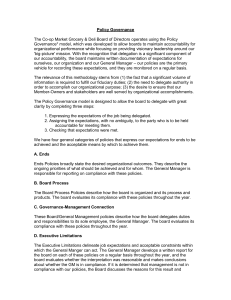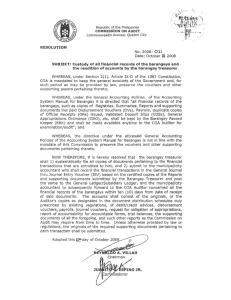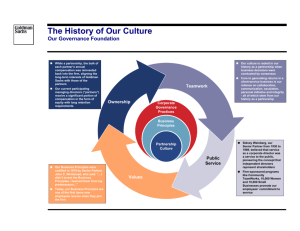Describing our idea or vision of good governance What - ANSA-EAP
advertisement
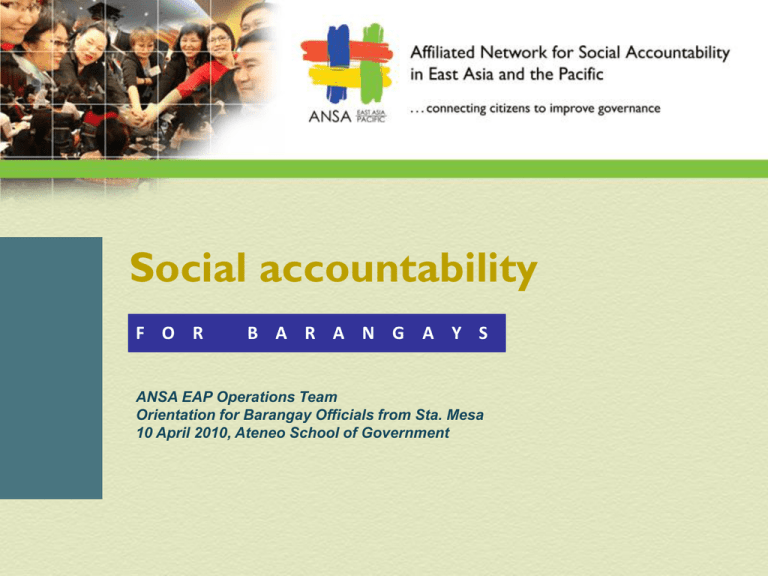
Social accountability F O R B A R A N G A Y S ANSA EAP Operations Team Orientation for Barangay Officials from Sta. Mesa 10 April 2010, Ateneo School of Government Introductions: • Name, barangay or organization, position • Something that no one else in the room knows about you • What are you bringing to the workshop? • What do you wish to bring home from the workshop? Suggested learning objectives: 1. To describe our idea or vision of good governance and relate it to our work in the barangay; 2. To explain how social accountability contributes to achieving good barangay governance; 3. To translate lessons into plans or actions to improve the enabling environment and mechanisms for social accountability in the barangay. Suggested process: 10.00 – 10.30 Introductions and preliminaries 10.30 – 11.30 Workshop 1: Our idea of good governance 11.30 – 12.00 Social accountability for good barangay governance 12.00 – 13.00 LUNCH BREAK 13.00 – 13.30 Reflection/Plenary discussion 13.30 – 14.30 Workshop 2: What we have now?/What we can improve? 14.30 – 15.00 Sharing of action points, synthesis and closing Workshop 1: Describing our idea or vision of good governance What to you is good governance in the barangay? • Write your answer on an idea card. Maximum of 3 lines per card. Write in large, bold letters. Then tape your idea card on your chest. • Stand up, go around the room, and read each other’s idea card. • If you see an idea card(s) that you think is similar to what you have, group together. Choose a “champion” in your group. Look for a place where you can converse and deepen your insights. Be sure everybody in the group participates. • Write on an easel sheet the highlights of your conversation. Then report to the big group. The United Nations defines 8 characteristics of good governance: Transparency • Decision-making and enforcement follow set rules and regulations • Information is freely available for those who will be affected by decisions • Information is adequate, relevant, easily understandable Accountability • Those in power should be answerable to those who will be affected by their decisions or actions • They should also be responsive to the needs of citizens from whom their power is derived • Involvement of citizens in decision-making and in efforts to improve their conditions • Citizens should have freedom to associate, capacitate themselves, and express their interests and views Participation Transparency Accountability Participation LEGAL and POLICY FRAMEWORK FOR TAP: Philippine Constitution of 1987 Bill of Rights, Section 7 • Right of people to information • Access to official records shall be afforded the citizen Republic Act No. 6713 Code Of Conduct And Ethical Standards For Public Officials And Employees • Public officials and employees shall at all times be accountable to the people • All public officials and employees are obliged to submit annual performance reports which shall be open and available to the public 1991 Local Government Code of the Philippines Decentralization • Establishment in every LGU of an accountable, efficient, and dynamic governance structure that will meet priority needs of its communities. Local mechanisms for citizen participation: Local initiative and referendum CSO participation in local development councils and special bodies: Local Health Board Local School Board Local Peace and Order Council Local PBAC Other optional bodies Other participatory governance mechanisms: 1992 National Integrated Protected Areas Act (protected area management board) 1997 Indigenous People’s Rights Act (ancestral domain management board) 1998 Agricultural and Fisheries Modernization Act (fisheries/agricultural resources management board) In 1996, a coalition of civil society organizations embarked on a Participatory Local Governance (PLG) or Barangay Training and Management (Batman) Project with support from Ford Foundation • The project was conducted in 877 barangays • Post project study of results in (2002) 14 PLG barangays that have approved BDP and 14 non-PLG barangays • Among the assessment criteria: TAP Findings Magno, Francisco (2002). Participatory Local Governance and the Protection of Vulnerable Sectors • Barangay development plans are not only more comprehensive but also more feasible • Increased level of awareness among citizens of the role and responsibilities of barangay officials • Openness and levelling of expectations forced public officials to perform better and deliver outputs • Shifts in prioritizing projects: from aesthetics to those necessary for well-being of citizens So, WHAT is social accountability and HOW does it contribute to good governance? “Organized and capable citizens engaging constructively with government to monitor its decisions and actions toward better delivery of public services, improvement of people’s welfare, and protection of people’s rights.” Constructive engagement • Citizens groups and government • Evidence- or information-based • Results- or solutions-oriented • Sustained engagement Monitoring the Public Financial Management (PFM) cycle Performance monitoring and evaluation Expenditure management Development planning Budget formulation Social accountability tools Participatory planning: Naga City People’s Council • Votes and participates in deliberations on design, implementation and evaluation of city projects and programs Social accountability tools Budget monitoring: NGO Forum in Cambodia • Performed monitoring and analysis of the national budget from 2004 to 2006 • Key findings: Share of budget items for “pro-poor” programs have decreased Social accountability tools Participatory expenditure tracking: Concerned Citizens of Abra for Good Governance (CCAGG) • CCAGG works out a plan with the concerned government agency to monitor spending on and implementation of infrastructure project Social accountability tools Participatory performance monitoring: Citizen report card - Bandung Institute of Governance Studies (BIGS), Indonesia • Conducted surveys, seminars, focused group discussions with urban poor to measure effectiveness and genderresponsiveness of government’s housing policy. For constructive engagement and effective citizen monitoring under social accountability to happen … We need to have the 4 pillars of an enabling environment: Government openness Organized and capable citizens Access to information Cultural appropriateness Workshop 2: What we have now? What we can improve? What do we have now in our barangay in terms of constructive engagement or social accountability? What can we do to improve what we are doing and enhance constructive engagement and citizen monitoring? What do we want to achieve in our barangays within the next 6 months? (Goal-setting) salamat po
